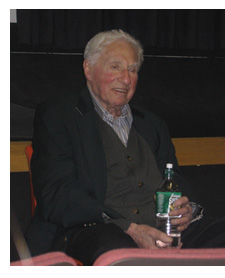Thursday was a busy night in the Boston film community. The choices ranged from a theatrical screening of the upcoming HBO Peter Sellers film, a preview of Mike Nichols’ Closer at the Harvard Loews, a preview of The Sea Inside with a q & a with Javier Bardem at the Boston Loews, and finally, a screening and q & a with screenwriter and novelist (and, umm…legend) Budd Schulberg at B.U. I was tempted by all of the choices, but opted for the most unique and least likely to repeat itself, a chance to hear the author of What Makes Sammy Run? and the screenwriter behind On the Waterfront discuss his work.
 The evening began with a screening of the second Schulberg script directed by Elia Kazan, A Face in the Crowd. I’d barely heard of it before last week, but I’m glad I caught it; it was scary, smart, and remarkably ahead of its time. It starred a pre-“Andy Griffith Show” Andy Griffith, a pre-everything Lee Remick, and a young Walter Matthau, among others. Budd Schulberg is ninety years old, still a sharp, spry man, and has known just about everyone, it seems, in film and literature over the last eighty years. He’s worked with directors like Kazan, John Ford, and Nicholas Ray; actors like Marlon Brando and Humphrey Bogart; bigwigs like Louis Mayer and Jack Warner; and as a child of Hollywood, it seems he knew just about everyone else. When names like Dorothy Parker, Sinclair Lewis, and F. Scott Fitzgerald are dropped, though, things get weird; when he was asked in 1939 to work with Fitzgerald, even Schulberg apparently said “I thought he was dead.” Schulberg graduated from Dartmouth in the class of 1936, and he and Fitzgerald worked together on the flop Winter Carnival there (though Fitzgerald was in Hanover for a weekend and disappeared, drunk, and was fired in front of the Hanover Inn).
The evening began with a screening of the second Schulberg script directed by Elia Kazan, A Face in the Crowd. I’d barely heard of it before last week, but I’m glad I caught it; it was scary, smart, and remarkably ahead of its time. It starred a pre-“Andy Griffith Show” Andy Griffith, a pre-everything Lee Remick, and a young Walter Matthau, among others. Budd Schulberg is ninety years old, still a sharp, spry man, and has known just about everyone, it seems, in film and literature over the last eighty years. He’s worked with directors like Kazan, John Ford, and Nicholas Ray; actors like Marlon Brando and Humphrey Bogart; bigwigs like Louis Mayer and Jack Warner; and as a child of Hollywood, it seems he knew just about everyone else. When names like Dorothy Parker, Sinclair Lewis, and F. Scott Fitzgerald are dropped, though, things get weird; when he was asked in 1939 to work with Fitzgerald, even Schulberg apparently said “I thought he was dead.” Schulberg graduated from Dartmouth in the class of 1936, and he and Fitzgerald worked together on the flop Winter Carnival there (though Fitzgerald was in Hanover for a weekend and disappeared, drunk, and was fired in front of the Hanover Inn).
Schulberg talked about his close relationship with Elia Kazan, whom he called “Gadge,” Marlon Brando, with whom he connected on political and social issues, and his father, B. P. Schulberg, a studio head in Hollywood. He seems like the last of a breed of people who are intertwined in the worlds of film and literature, as comfortable seeking out the curmudgeonly Sinclair Lewis and spending a weekend drinking highballs and talking about writing with him as they are working with people like Brando and Bogart. It was a real privilege to hear him speak and to listen to stories of some of his incredible experiences.





















